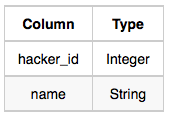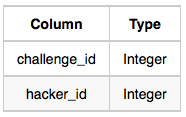Julia asked her students to create some coding challenges. Write a query to print the hacker_id, name, and the total number of challenges created by each student. Sort your results by the total number of challenges in descending order. If more than one student created the same number of challenges, then sort the result by hacker_id. If more than one student created the same number of challenges and the count is less than the maximum number of challenges created, then exclude those students from the result.
Input Format
The following tables contain challenge data:
-
Hackers: The hacker_id is the id of the hacker, and name is the name of the hacker.

-
Challenges: The challenge_id is the id of the challenge, and hacker_id is the id of the student who created the challenge.

Sample Input 0
Hackers Table: Challenges Table:
Challenges Table:
Sample Output 0
21283 Angela 6
88255 Patrick 5
96196 Lisa 1
Sample Input 1
Hackers Table: Challenges Table:
Challenges Table:
Sample Output 1
12299 Rose 6
34856 Angela 6
79345 Frank 4
80491 Patrick 3
81041 Lisa 1
Explanation
For Sample Case 0, we can get the following details: 
Students and both created challenges, but the maximum number of challenges created is so these students are excluded from the result.
For Sample Case 1, we can get the following details: 
Students and both created challenges. Because is the maximum number of challenges created, these students are included in the result.
/* these are the columns we want to output */
select c.hacker_id, h.name ,count(c.hacker_id) as c_count
/* this is the join we want to output them from */
from Hackers as h
inner join Challenges as c on c.hacker_id = h.hacker_id
/* after they have been grouped by hacker */
group by c.hacker_id
/* but we want to be selective about which hackers we output */
/* having is required (instead of where) for filtering on groups */
having
/* output anyone with a count that is equal to... */
c_count =
/* the max count that anyone has */
(SELECT MAX(temp1.cnt)
from (SELECT COUNT(hacker_id) as cnt
from Challenges
group by hacker_id
order by hacker_id) temp1)
/* or anyone who's count is in... */
or c_count in
/* the set of counts... */
(select t.cnt
from (select count(*) as cnt
from challenges
group by hacker_id) t
/* who's group of counts... */
group by t.cnt
/* has only one element */
having count(t.cnt) = 1)
/* finally, the order the rows should be output */
order by c_count DESC, c.hacker_id